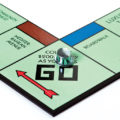Stephen Covey wrote a bestselling book called “The 7 Habits of Highly Effective People”, which shares 7 lessons in Personal Change. One of my favorites is “Begin with the End in Mind.” This lesson seems to apply to almost everything in life. Sometimes I think of this as getting the big things right.
I remember packing my VW at the end of a college semester to go home. Somehow I got everything to college, but it never seemed to fit coming home. I always ended up with the mini fridge or bike sitting on the driveway. And I just wanted to get out of there. Maybe I was in a rush.
But I found that with practice and by beginning with the big things, somehow everything would fit. My plans weren’t perfect: just start with the big, heavy things. The smaller things fit in wherever and I always found a way to get them in, without too much effort.
This is a great metaphor for your financial life. There are so many people telling you all the details of every conceivable thing. It seems overwhelming. Add to that the instant interpretation of the ups and down of the market, most of which is just noise. But it undermines your confidence and you start to feel like maybe you need help from one of the “experts”. But just like packing your car coming back from college, you don’t need an “expert” and you don’t need a detailed plan that takes everything into account. Just Begin with the End in Mind. Start with the Big Things.
So what are some of the Big Things? Here’s my list.
Retirement: This is probably the biggest. As a millennial, you should count on living to 100. This means you will need a bunch of money to cover several decades of living without an income. And nobody will give you a “loan” to cover living expenses when you’re retired. So get started as soon as possible on this one.
Healthcare: Most of us don’t have many health problems now, but when they do strike, they wipe people out. It’s just like hurricanes along the coast. One may not have hit you yet, but you know it will, and when it does, it’s going to be painful. Living a healthy lifestyle is great “insurance” and makes life enjoyable for a long time. And having some decent health insurance keeps catastrophes from wiping you out financially.
Debt: I’m not against debt, but it has to be reasonable compared to your income, and of the right kind. The right kind of debt is that which builds up your human capital (your skills, employability, etc.), or is for an appreciating asset (like a reasonable cost home, not a speculative or “stretch” house). Try to avoid any other kind of debt, and pay it off quickly. Especially credit cards.
College savings for kids: If you have kids, then help them get a good education for the smallest price possible. Saving anything, and considering the state university helps tremendously. But get started when they are born, even with a small amount.
That’s it. Everything else is the small stuff. Keep it in check, but don’t sweat it.
What are your thoughts?




Leave a comment